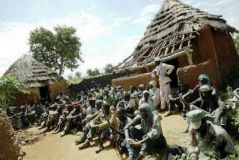Darfur rebel SLA holds unity congress to repair splits
Oct 28, 2005 (DARFUR, Sudan) — Darfur’s main rebel group gathered for a unity congress on Friday at a secret location to heal leadership rifts and inject life into stalled talks to end the conflict that has killed thousands in remote western Sudan.

|
|
Sudan Liberation Army rebels from different bases come together for a meeting in Tarenjer village, west Darfur, October 11, 2004. (Reuters). |
Factionalism within the main rebel Sudan Liberation Army (SLA) and escalating violence in Darfur has hampered African Union-sponsored peace efforts in the Nigerian capital Abuja, which ended a sixth round on Oct. 20 with little progress.
The SLA congress, the first of its kind for the rebels, hopes to produce a joint position for the talks and unite rank-and-file field commanders under a new, elected executive over three days of intensive discussions.
Field commanders said they called the congress because they were worried about stand-offs between the leaders in Abuja.
“We are all fighting for the same cause,” said SLA commander Ali Mokhtar. “These are just personality differences which have to be put behind them.”
Personality differences between the SLA’s two main leaders, Secretary-General Minni Arcua Minnawi and President Abdel Wahed Mohamed el-Nur have meant the two rarely present a united front.
Minnawi spends much more time in the field, a move which has garnered him more support among the military commanders. Nur refused to attend the conference, but returned to Darfur this week for the first time in more than a year, which observers say was because he feared losing his position on the ground.
The location of the SLA meeting is a closely guarded secret to ward off any desire by Arab militia, known locally as Janjaweed, to attack.
“Any attack on the conference will be considered an attack on the peace process, and we will react harshly,” said chief organiser Ibrahim Ahmed Ibrahim.
The militias stand accused of a widespread capaign of rape, killing and burning in non-Arab villages during the 2-1/2 year-old revolt, which forced more than 2 million from their homes and sparked a major humanitarian crisis.
Rebels say the Janjaweed work for the government, a charge Khartoum denies. The International Criminal Court is investigating charges of war crimes in Darfur, although the government has refused to cooperate with the court.
Libyan leader Muammar Gaddafi, who has tried to mediate between rebels and the Sudanese government, has donated equipment and food to the congress.
But some observers say other international players have not been supportive of the conference, saying it should have been called by Nur and would only increase factionalism within the movement.
“They are under huge pressure as some diplomats have threatened to withdraw all support if they go ahead with this,” said a source close to the Abuja talks.
The top U.N. envoy in Sudan, Jan Pronk, had earlier encouraged the conference and pledged to help, but has since not provided assistance and will not attend. Top AU commanders of the 6,000-strong ceasefire monitoring mission in Darfur will attend the meeting.
The smaller rebel group represented in Abuja, the Justice and Equality Movement (JEM), are also dogged by splits and breakaway JEM factions earlier this month abducted a team of AU personnel, demanding a seat at the negotiating table.
(Reuters)
